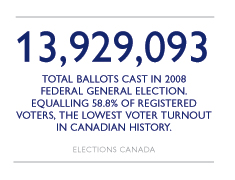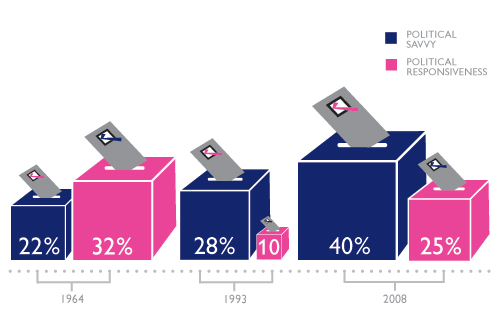Are Canadian youth really politically apathetic?

Young Canadians are the most politically savvy they’ve ever been — at least they think they are.
This is an interesting research finding that’s surfaced from Concordia Political Science master’s student Vincent Hopkins.
In his preliminary study, “Confident yet Unmotivated: The New Canadian Youth and Political Engagement 1965-2008,” Hopkins looked at how Canadians aged 18 to 34 perceive their own effectiveness in the Canadian federal political process over four decades.
What he’s found is that the trend of feeling “politically savvy” — seeing oneself as able to understand and influence the political system — among this age group has generally risen steadily since 1965.
The increase suggests that younger voters are not as apathetic as they are often portrayed.
“Youth aren’t apathetic or disinterested. These days, they protest more, they sign more petitions. Voting isn’t the only way to measure political engagement,” says Hopkins, who plans to prepare the paper for publication in 2012.
At the same time, the study found the trend of “political responsiveness” — the sense that the political system is receptive to one’s political/social needs and desires — steadily declined from 1965 to 1993, only to begin climbing following the 1993 federal election. As voter turnout with this age group reached a record low in the 2008 federal election at 39 per cent, he says the evidence suggests that political parties perhaps are simply failing to connect to the young electorate, an age group that currently tends not to take politicians at their word.

So what’s changed since 1965? Among the possible reasons would be more accessible education that’s allowed young people to change how they perceive the system and themselves in that system, says Hopkins.
“When looking historically at voter disengagement, there is wave after wave of bad news. The one bit of good news we found is that more young people go to school, feel more confident, and place more demands on the political system than ever before.”
The information for the study was gleaned from the Canadian Election Study (CES), a repository of survey information gathered for university researchers from every federal election since 1965.
Of the roughly 400 questions asked on the CES (age, gender, social issues, income, political affiliation, etc.), Hopkins and his supervisor, Political Science professor Mebs Kanji, looked at two for each trend.
For political savvy, they looked at the strongly agree / strongly disagree responses of respondents to the statements, “Sometimes, politics and government seem so complicated that a person like me can’t really understand what’s going on,” and, “People like me don’t have any say about what the government does.”

Those who strongly agreed with the statements would be deemed to have low political savvy; those who strongly disagreed would have high political savvy.
For political responsiveness, they examined the strongly agree/strongly disagree responses to, “Generally, those elected to Parliament soon lose touch with the people,” and, “I don’t think the government cares much what people like me think.”
Those who strongly agreed with the statements would regard government to have low political responsiveness; strongly disagree would regard government to have high political responsiveness.
Hopkins stops short of saying why the young population does not actually vote because, “there are no golden bullets to figuring out why people vote or don’t vote. It might be that the government has not changed, or that young people have changed and are seeing the system in different terms, but we can’t say for sure. If I knew, I’d be a billionaire.
“Regardless, the idea that young Canadians see themselves as more politically competent now than at any time since the ’60s, I think is really interesting.”
Watch Rick Mercer's rant that encourages Canadian youth to vote:
Related links:
• "Vox-pop on federal election: Will Concordians vote on May 2?" - Now, April 21, 2011
• Concordia Department of Political Science
• Canadian Election Study
• Elections Canada